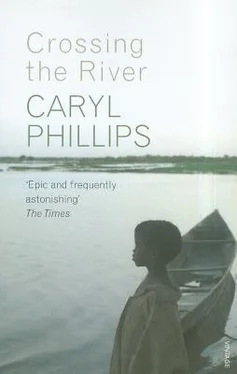Caryl Phillips - Crossing the River
Здесь есть возможность читать онлайн «Caryl Phillips - Crossing the River» весь текст электронной книги совершенно бесплатно (целиком полную версию без сокращений). В некоторых случаях можно слушать аудио, скачать через торрент в формате fb2 и присутствует краткое содержание. Год выпуска: 2006, Издательство: Vintage, Жанр: Современная проза, на английском языке. Описание произведения, (предисловие) а так же отзывы посетителей доступны на портале библиотеки ЛибКат.
- Название:Crossing the River
- Автор:
- Издательство:Vintage
- Жанр:
- Год:2006
- ISBN:нет данных
- Рейтинг книги:4 / 5. Голосов: 1
-
Избранное:Добавить в избранное
- Отзывы:
-
Ваша оценка:
- 80
- 1
- 2
- 3
- 4
- 5
Crossing the River: краткое содержание, описание и аннотация
Предлагаем к чтению аннотацию, описание, краткое содержание или предисловие (зависит от того, что написал сам автор книги «Crossing the River»). Если вы не нашли необходимую информацию о книге — напишите в комментариях, мы постараемся отыскать её.
Crossing the River — читать онлайн бесплатно полную книгу (весь текст) целиком
Ниже представлен текст книги, разбитый по страницам. Система сохранения места последней прочитанной страницы, позволяет с удобством читать онлайн бесплатно книгу «Crossing the River», без необходимости каждый раз заново искать на чём Вы остановились. Поставьте закладку, и сможете в любой момент перейти на страницу, на которой закончили чтение.
Интервал:
Закладка:
On the evening of November 3rd, 1841, the Mercury set sail out of New York harbor. On deck, Edward Williams knelt and prayed both for the soul of his dearly departed Amelia, and for the success of the journey he was embarking upon. As they passed out beyond the stillness of the river and into the sea, he leaned over the rail and watched his beloved America recede from view and eventually vanish behind the horizon. Sadly, within a day of their departure, thick black clouds appeared overhead and they hit upon a terrible storm in which the ceaseless rain cascaded down from a perpetually dark sky. Edward remained below and listened through the planks to the moaning of his fellow passengers, a parcel of Louisiana blacks headed for the coast, who lay about the boards stricken into various stages of mortality. They were a week out of New York, and the storm had still not abated, when the mast came crashing down. The sailors were men of experience, but for some time it appeared as though the ship would have to be abandoned to the wind and waves, for there seemed to be no end to this tempest. All who were able were summoned on deck to help repair the ailing vessel, but by this time Edward had contracted the fever and was unable to bestir himself in any way. He lay below and listened to the painful creaking and straining of the wood, as the squalls grew ever more violent. Mercifully, midway through the second week, the storm finally blew itself out, but soon after the true and unbearable force of the sun’s heat was upon them. Long, sunstruck afternoons assailed the ship, the sky forever clear and without even the slightest stain of a cloud, the air still and bereft of any breeze that might flutter a sail or distort the mirror of the sea. The journey was now in danger of becoming prolonged past the supply of food and, more crucially, water. Sadly, despite the efforts of the ship’s surgeon, Edward’s ghastly condition, his body roaring with fever, showed no sign of improving. The Captain, a man renowned for his sagacity, resigned himself to the inevitable loss of his most illustrious passenger.
At last, on the evening of December 14th, 1841, the Mercury limped into the harbor at the British settlement of Freetown, Sierra Leone, the Captain having thought it politic to acquire fresh supplies and immediate medical help for those, like Edward, who lay between life and death. Natives came on board and bore Edward, perspiration flowing down his forehead, his body racked with chills and fever, into a crudely constructed rowing boat. Through the haze of illness Edward could hear, in fact almost taste, the sea, which stretched out all around him, melancholy and still. By straining his half-closed eyes, it was possible for him to discern the shoreline, where torches burned in the moonless dusk. The short journey seemed interminable, and was made worse by the descent of a thick mist which soon turned into a light rain. On reaching Freetown, Edward was clumsily lifted on to a rudimentary cart that was to be pulled by a solitary mule. The black driver yelled at the dispirited beast, and Edward felt the cart lurch, the wheels spin idly in the mud, but the whole contraption remained painfully static. After much bellowing and inconvenience to Edward, he was eventually, by these impossible means, transported to a mission hospital whose only virtue appeared to be the number of white faces which inhabited this otherwise insanitary place. Here Edward lingered for some days, his hand in the hand of his God, until the tide turned and washed him back upon the shores of this earth.
After a week, in which his body grew accustomed to solid foods, and in which he learned how to walk again without aid, Edward was impatient to commence upon the final measure of his journey. It was at this juncture that the British doctor informed him that his ship, the Mercury , had set sail without waiting for those passengers who had been discharged. It appeared that some trading dispute had broken out between Sierra Leone and Liberia, which meant that all exchange, commercial or otherwise, between the two territories had, for the time being, been suspended. Apparently, the Mercury was not welcome in Sierra Leone as long as she flew openly and with pride the American flag. Edward felt desperate, and made immediate and hourly cross-examination of the doctor as to how he might reach Liberia. He was keen to impress upon this man the seriousness of his intent, but the doctor was powerless to help beyond offering up the suggestion that either Edward attempt the passage overland, or he wait in Sierra Leone for this diplomatic squabble to subside. In response to Edward’s enquiries as to the general health of the Liberian experiment, the doctor simply shrugged his shoulders. What could he say? He had never been to Liberia, but neither would he want to travel there. Here, in the Crown Colony of Sierra Leone, he was British. There he would be nothing. He touched Edward lightly on the arm, in that manner which doctors soon accustom themselves to in order that they might assuage the fears of their patients. His advice was to wait. He assured Edward that these disputes tended to be short-lived. There was little to be gained by worrying excessively.
Monrovia, Liberia
September 11th, 1834
Dear Beloved Benefactor,
I am exceedingly happy to take up my pen and embrace this precious opportunity of addressing you a few lines. I trust that God in His mercy will spare you to read these words and many more. My family and I were blessed with a safe and prosperous passage over the briny deep, and delivered safely to this African land. Accordingly, I thank God that I remain alive to have the pleasure of writing to you from distant shores. Though we are separated by wide waters and steep mountains, you, my dear father, are forever with me in my mind. That we were only seventeen days at sea speaks of the fine weather that we were fortunate enough to have bestowed upon us. Further, the ship happily improved her numbers, for there was one birth at sea. This is the first opportunity I have had to send to you a humble communication since our arrival here. I do so in the hope that my crude lines might find both yourself and your wife in fine health, thanks be to God. We are all well, with the exception of young York, upon whom the sea-sickness vented itself with uncommon fury, and whose childish body has yet to recover equilibrium. Fortunately, my wife Sally is of a more rigorous constitution and dutifully nurses him while I attend to more pressing matters. Among the other emigrants of our ship with whom you will be familiar, only old Nancy and big Mabel were ill at ease on the sea. The rest are somewhat well, and earnestly salute your noble person, although many are now touched up with the African fever.
Galloway Williams is dead. He died only a day since. His wife, Constance, who arrived in this country aboard the same packet as myself, was only last week delivered of a fine son, but alas the Lord saw it fit to take the child. He could not have taken it at a better time, the child being but an infant, but He soon after took to Him Constance also, to be with the child, and now Galloway to afford his wife some support in the hereafter. The Lord giveth and the Lord taketh, blessed be the name of the Lord. The burden you placed upon us of repeating the Ten Commandments, which we considered a form of punishment, has proved of the utmost importance in meeting the pain of these trying times. As a father you cared for us, and we hope that the Lord will reward you for your kindness.
Liberia is a fine place to live in. I was at first astonished to see the bushes that grow in the streets, and the boldness of the nature all about, but my person is now accustomed to these strange sights. Thank God I have been spared to reach here in good health and by His permission do still enjoy it. The town of Monrovia is well-watered and timbered, and if a person could have a little capital he would do very well. A colored person can enjoy his liberty in this place, for there exists no prejudice of color and every man is free and equal. Although, dear father, I am greatly desirous of seeing you again before we leave this world, I doubt if I shall ever consent to return again to America. Liberia, the beautiful land of my forefathers, is a place where persons of color may enjoy their freedom. It is the home for our race, and a country in which industry and perseverance are required to make a man happy and wealthy. Its laws are founded upon justice and equality, and here we may sit under the palm tree and enjoy the same privileges as our white brethren in America. Liberia is the star in the East for the free colored man. It is truly our only home.
Читать дальшеИнтервал:
Закладка:
Похожие книги на «Crossing the River»
Представляем Вашему вниманию похожие книги на «Crossing the River» списком для выбора. Мы отобрали схожую по названию и смыслу литературу в надежде предоставить читателям больше вариантов отыскать новые, интересные, ещё непрочитанные произведения.
Обсуждение, отзывы о книге «Crossing the River» и просто собственные мнения читателей. Оставьте ваши комментарии, напишите, что Вы думаете о произведении, его смысле или главных героях. Укажите что конкретно понравилось, а что нет, и почему Вы так считаете.












